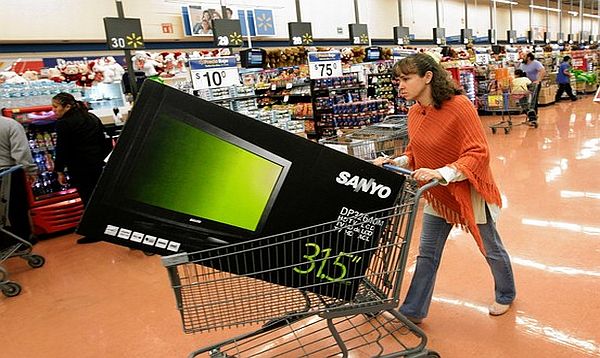Querétaro, Mexico — Although most people still picture Mexico as a country where the poor majority are dominated by a few wealthy elite, the reality is a growing number of middle class Mexicans that are crowding new Wal-Marts and Costcos, driving their Nissan sedans to KFC, and maxing out their Banamex credit cards.
A cautious but determined middle class is rapidly becoming the majority in Mexico, breaking down the wealthy-impoverished separation in a demographic transformation that has far-reaching ramifications here and in the US.
The stereotype is no longer an illegal migrant worker pressing for day labor outside a Home Depot in the US. The new Mexican is the over-scheduled soccer dad shopping for a barbecue grill at that same Home Depot, only located in booming cities like Querétaro.
The members of this class are not worried about their children not getting enough to eat, they’re worried that they are eating too much.
 |
It was the middle class that gave Calderon his narrow victory in 2006, and according to political analysts from all three major parties, the new middle class will be a major force in the upcoming presidential election this July. This new class in Mexico doesn’t want to lose what it’s worked so hard to gain.
Mexico's middle class flourishes here in the country's central landscape, in busy industrial cities that have little in common with the violent border towns to the north or the tourist driven economies of the resort areas.
In Querétaro (capital of the Mexican state of Querétaro located two hours north of Mexico City and home to about a million residents) new subdivisions and industrial parks are sprouting up all across the area in and around the city. A welcoming sight for aspiring Mexican families drawn by the promise of good jobs and safe neighborhoods.
It is in cities like Querétaro where you can see the new Mexico of 60-hour work weeks, major US retail stores, and private English-language academies turning out the bilingual young people who will run these businesses. It is the Mexico where people pay $5 for movie tickets and where public golf courses and tennis courts have waiting lists.
It is the Mexico where NAFTA dreams came true, where billions in foreign investment have fostered a flourishing aircraft-manufacturing industry anchored by companies such as Bombardier Aerospace, General Electric, and Siemens.
To estimate the number of middle class in Mexico, which has a population of around 114 million, you can't use a straightforward calculation, as it is done in the US.
Scholars argue that in a developing country such as India, China, and Mexico, the middle class can be measured by what its' members consume. By this definition, a Mexican home owning family with new appliances, a car, and cell phones is considered middle-class. Even if the combined total salaries of the household members would be considered poor by US standards.
Another measure is perception: if you think you are middle-class, then you are middle-class. According to a recent survey conducted in Mexico, 65 percent of respondents consider themselves middle class, 27 percent described themselves as lower class, and only 2 percent admitted to upper-class status.
"If you look into the average Mexican's wallet, you realize the country is not growing that fast," said Willy Azarcoya, founder of a marketing-research firm there. Azarcoya is referring to the steady but tenuous annual GDP growth of 2 or 3 percent. "But the difference is the change in attitude, people now believe they can achieve things."
Azarcoya acknowledged that Mexico still harbors a huge number of poor — between 25 and 50 percent of the population, depending on the measures. Poverty trended slightly upward after the 2008 global recession, but Mexico's middle-class march is back and showing a steady climb out of mass poverty.
The number of credit cards in circulation nearly quadrupled between 2002 and 2009, according to Mexico's Central Bank, and there are now more than 20 million cars on Mexican roads, up from 4 million in 1980.
The middle class is definitely the engine for progress in Mexico, but debt leaves many Mexicans sensing that their foothold is slippery.
"You may be considered middle class, but you still feel poor," states Oscar Marquez, a 33-year-old father who has worked for 10 years at Telcel, the phone giant controlled by Mexican tycoon Carlos Slim.
"A good salary at Telcel is about $1,000 to $1,500 a month," Marquez said, "enough for today but maybe not for tomorrow. We live well, but it's living well day to day."
Smaller families are a characteristic of the growing middle class. In 1960, Mexican families averaged 7.3 children, today it's 2.3, slightly above the rate of 2.1 in the US.
But while family size is shrinking, education levels are growing. Since 1980, the number of Mexicans receiving a university education has tripled, according to the Organization for Economic Cooperation and Development. Private for-profit universities with relatively affordable tuitions are thriving. Schools such as TecMilenio with 40 campuses across Mexico that also offer students the option of taking classes via the Internet.
Gabriel Paulin, 30, went to college, got an MBA and moved to Querétaro as a sales manager at a company that makes industrial disinfectants for Mexican agribusiness - mostly farms that export to the United States. Parked outside his modern condo in a new subdivision in Querétaro, is his new Mitsubishi pickup. He said a salary for his position is about $31,000 a year.
"There are good opportunities right here," he said. "There's no reason to leave the country in search of a better life."


